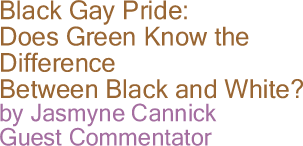
Issue 140 - June 2 2005
Printer Friendly Version
|
The Miami Herald recently ran an article entitled "Gay Pride Celebrations: the Nation’s Top 10 Festivals are Diverse and Delightful.” Unfortunately there was nothing diverse or delightful in its choices. Topping the list of most festive gay pride celebrations were New York City, San Francisco and Long Beach, California. However, their equally popular and festive counterparts were nowhere to be found on the list. As Black gay pride organizers scramble to provide comprehensive cultural celebrations for their thousands of anticipated guests this year, the Herald's top ten list was a slap in the face and further feeds into the notion that gay and now gay pride is white. The International Federation of Black Prides is home to 25 Black gay pride celebrations, including Toronto and South Africa. These cultural celebrations are flocked to each year by thousands of Black same-gender loving persons are all over the country, some with a cult following. The three largest and highly attended celebrations include D.C. Black Pride celebrating 15 years Memorial Day weekend, At the Beach Los Angeles Black Pride celebrating 17 years Independence Day weekend and Atlanta Black Pride celebrating 9 years Labor Day weekend. These celebrations each typically bring in around 10,000 people that are culturally diverse, socially active, event loyal, frequent travelers and beauty, health, fitness and fashion conscious. Given all of these facts, why then do Black prides still receive less financial support than their white counterparts? A look at the websites of the Herald's top ten picks shows financial support from Delta Airlines, Travelocity, Absolute Vodka, Gay.com, Showtime, Starbucks, Bud Light, Bank of America, PlanetOut.com, Hertz, Virgin and more. But take a closer look at who is sponsoring Black pride celebrations. Black pride organizations cater to the Black gay community and unfortunately, this community is still being affected in large numbers by the HIV/AIDS epidemic. So it's only obvious that pharmaceutical companies and AIDS service organizations would want to sponsor events where they can target a high number of Black gays with their message. However, there is so much more to the Black gay community than HIV/AIDS prevention. We dine out, read the newspaper, watch television, travel, buy clothes, and are included in the overall contributions of African-Americans to the U.S. economy. In addition, it's not just at the corporate level that companies do not sponsor Black gay pride celebrations. Many elected officials shun off Black pride celebrations to their health deputy's (HIV/AIDS) instead of to their city's cultural affairs office where these celebrations should be getting support from as well. Like Black film festivals that highlight Blacks in the filmmaking business, Black gay pride celebrations are cultural events that celebrate the uniqueness of being Black and gay. So that should open up a plethora of sponsorship opportunities for Black gay prides, not only from the companies listed above but from Viacom who owns Black Entertainment Television, TVOne, RadioOne, Ebony, JET, ESSENCE, Walmart, Target, NAACP, Urban League, music labels, and other businesses that thrive off of Black dollars. With the new gay networks HERE and LOGO targeting gay viewers, they too could benefit from marketing to Black gays at pride celebrations. Without the support of the Black gay prides last year, LOGO's Noah's Arc, America's first Black gay television series debuting in September, would probably still be a straight-to-DVD production. I once had a corporate marketing executive tell me that they sponsored a Black film festival and sponsored a gay pride celebration so they didn't see the need to sponsor a Black gay pride. In their minds, Black was straight and gay was white and there was nothing in between. Sadly, that's the misinformed thinking of many corporate executives when it comes to marketing. The irony in all of this is that at most white gay pride celebrations, you see about a handful of Blacks. In a recent poll, Black gays were asked, if given a choice would you attend a white pride celebration or a Black pride celebration. An overwhelming number of those polled indicated that they would attend their Black pride celebration. If white Conservative Christian evangelicals can see the value in marketing to straight Blacks regarding gay marriage, why can't companies see the value in marketing to Black gays? Take me for example. I am a 27-year-old Black lesbian. I listen to National Public Radio everyday. I have a subscription to my local daily newspaper, the Advocate, Black Enterprise, and ESSENCE Magazine. I watch Desperate Housewives every Sunday and pick up my weekly Black newspapers every Thursday and Friday. I shop faithfully at Lane Bryant and Ashley Stewart. I find myself in an airport traveling once or twice a month and I vote regularly. I think quite a few companies would benefit from marketing me and others like me. So while, the Miami Herald probably boosted the incoming sponsorship dollars for the 10 prides it listed in its article, it did a disservice to people of color gay prides across the nation and further fed into corporate America's notion that gay is white. Jasmyne Cannick is a member of the National Association of Black Journalists, a board member of the National Black Justice Coalition, a Black gay civil rights organization, and co-producer of the new cable series Noah's Arc, America's first Black gay series. A 27-year-old Los Angeles native, Jasmyne is a public relations and communications strategist who is pursuing her long-term interest in public policy and political activism. She can be reached via her website at www.jasmynecannick.com. |
Your comments are always welcome. Visit the Contact Us page to send e-Mail or Feedback or Click here to send e-Mail to [email protected] e-Mail re-print notice
If you send us an e-Mail message we may publish all or part of it, unless you tell us it is not for publication. You may also request that we withhold your name. Thank you very much for your readership.
|
